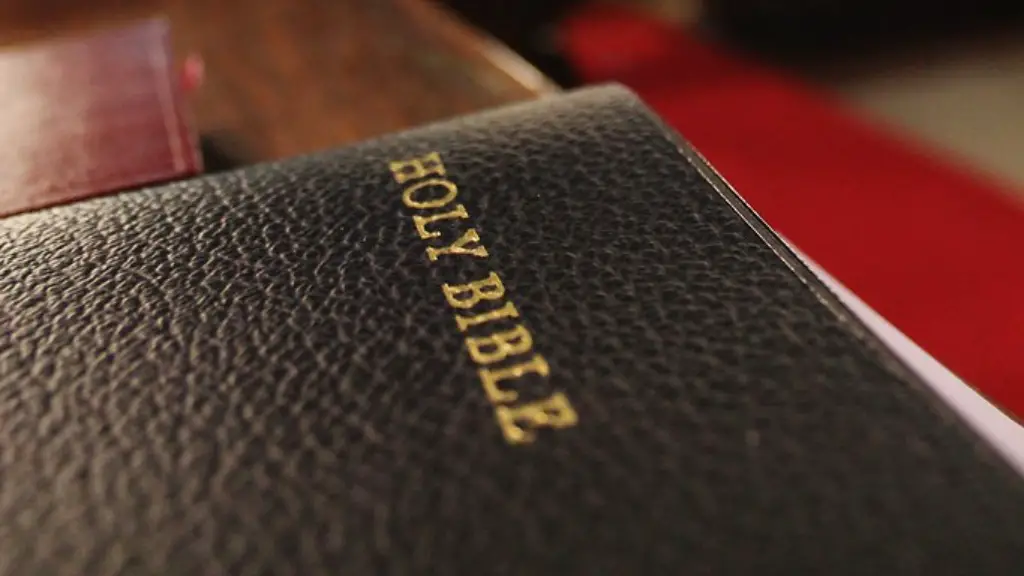Jehu was one of the Israelites mentioned in the Bible. He is best known for his role in overthrowing the House of Ahab and restoring Israel’s religion. In 2 Kings 9:1-10, it’s written that Jehu was anointed by Elijah the prophet to replace Ahab’s dynasty. In this passage, Jehu is also commanded to punish Jezebel and her sons. Consequently, Jehu then effectively wipes out the House of Ahab.
It is believed that Jehu was born and raised in the Northern Kingdom of Israel, likely during the Age of Divided Kingdoms. This would have been during the 9th century BC. His parents remain unknown, but it is believed they may have been associated with the House of Jehu, a family of the Northern Israelite tribe of Manasseh. From what is known of him, Jehu appears to have been a brave and formidable man, who was a military leader and a faithful follower of the Lord. He is also described as a ‘man of zeal’, indicating his unwavering devotion to God.
Although Jehu’s motivations for overthrowing the House of Ahab remain unclear, he is believed to have had a strong sense of justice, and he was an advocate for tradition and the Israelite religion. He was regarded as a leader by those who opposed the foreign practices of Jezebel, the wife of Ahab, who openly worshipped Baal.
One of the methods Jehu employed to overthrow the House of Ahab and restore the true religion involved a ruse. In 2 Kings 9:11, Jehu tricked the people of Jezreel into believing that he was on their side. Jehu invited the people of the nearby town of Jezreel to view a chariot race. When they arrived, he then ordered them to line up in two groups and proceeded to slaughter them. This act not only served to eliminate the entire House of Ahab but also signalled Jehu’s commitment to religious reform.
Once Jehu succeeded in overthrowing the House of Ahab, it took him several years to fully restore religious rule. In 2 Kings 10:29-31, it is written that during this time, he had been travelling from city to city destroying idols, obliterating altars, and establishing new worship sites to the Lord.
Modern scholars have come to varying conclusions about Jehu’s character. Some experts argue that he was a genuine follower of God who wished to reform Israel in line with the faith of their fathers, while others have suggested that he used religious ideology to seize power. What is certain is that his actions left an indelible mark on the history of the ancient Israelites, and that he has been remembered and celebrated in the Bible as a great warrior and leader.
Relationship with Jezebel
The Bible does not explicitly mention the relationship between Jehu and Jezebel. It is possible that she was his distant relative as some experts have suggested. Others have argued that Jehu himself may have been sympathetic to her due to her ties to the Canaanite gods. However, given Jehu’s mission to restore the spiritual integrity of Israel, it is likely that any relationship between Jehu and Jezebel was hostile.
In 2 Kings 9:30-33, it is written that upon his entry into the city of Jezreel, Jehu ordered Jezebel’s death. Jehu also ordered the bodies of Ahab’s sons to be thrown into the same grave as her, indicating that his hatred towards her was strong.
Additionally, in Revelation 2:20-21, it is written that Jezebel was labelled a “prophetess” who was misleading God’s servants with teachings related to pagan worship. This again suggests that any relationship between Jehu and Jezebel was distant at best.
Legacy
Although Jehu’s legacy has been tarnished by his acts of brutality, it’s worth noting that his actions served to restore and preserve the Israelite faith at an important point in its history. He also succeeded in unifying the Northern Kingdoms of Israel, leading to almost a century of prosperity and religious stability until the Assyrians invaded.
The legacy of Jehu is enshrined in the Bible, where he appears in several passages. In Hosea 1:4, he is referred to as a “prince of the destroyer”, while in John 10:11, Jesus mentions his name among those who were true to God’s word. He is remembered as a passionate and fearless leader, and his story continues to be studied and remembered.
Interpretations
Interpretations of Jehu’s actions differ depending on who is reading the story. Some may view Jehu as a hero who courageously and faithfully defended the Israelite religion, while others may find his use of violence questionable. However, one should remember that during this period in Israel’s history, it was common for rulers to employ oppressive measures in order to further their causes.
For example, the Bible records several military leaders who used atrocities to seize and maintain power, including Gideon and Saul. In light of this, Jehu’s actions cannot be judged in isolation. Rather, one needs to have a comprehensive understanding of the times in which he lived in order to gain a better appreciation of his legacy.
Cultural Relevance
The story of Jehu has continued to resonate with people of faith throughout the centuries. In Jewish and Christian cultures, the story of Jehu is often used to illustrate the importance of faithfulness to God’s word and devotion to one’s faith. For example, in several Christian denominations, Jehu is remembered as an example of righteous leadership, as his actions were ultimately driven by his devotion to the Lord.
In other respects, the story of Jehu also has relevance in today’s world. It serves as an apt reminder of the importance of upholding religious beliefs, particularly in the face of opposition. Moreover, it is also a testament to the power of one individual to make a positive difference in the world, despite the odds.
Impact on Israel
Jehu’s actions had a lasting effect on the culture and history of the Israelites. One major consequence of his rule was the strengthening of the central government. Rather than being governed by divided states, Israel became unified under one central king. This helped ensure that religious reforms were properly implemented, and it lead to almost a century of religious stability and peace.
In other respects, Jehu’s rule allowed a greater freedom of expression among the Israelites. Jehu did not follow the foreign practices of his predecessors, and he actively encouraged a return to traditional religious practices. This in turn helped to reinforce the importance of faith and the power of belief.
Additionally, Jehu’s rule also helped to re-establish the status of the ancient prophets of Israel. In particular, Elijah’s legacy was helped reinforced as his authority was recognised by Jehu. This prevented Elijah’s teachings from being forgotten and helped to ensure that his legacy would continue to be honoured.
Religious Perspective
From a religious perspective, Jehu’s story is full of meaning and purpose. His story not only serves as a reminder of the importance of faith in God, but it also demonstrates the power of believing in Him. This is succinctly expressed in Hosea 1:4, in which it says that Jehu was “zealous for the Lord”. This passage serves to illustrate the significance of belief and devotion in the eyes of God.
Moreover, the story of Jehu can also be seen as a metaphor for one’s journey towards faith. It is a reminder that even when we are threatened and face an uncertain future, we must have faith and remain devoted to God’s will. This lesson serves to remind us of the importance of valuing faith, and it is a lesson that can be applied to our own lives.
The story of Jehu is an important part of the religious legacy of the ancient Israelites, and it has endured for centuries. It is a testament to the power and importance of belief, and it serves as a reminder of the impact that one man can have on the course of history.





